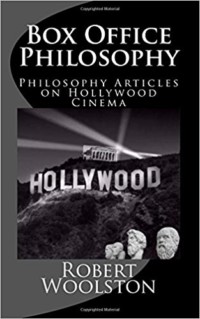Title: Box Office Philosophy – Philosophy Articles on Hollywood Cinema
Author: Robert Woolston
Publisher: PhilOwl Press
ISBN: 978-1975653620
Pages: 121
Genre: Philosophy
Reviewed by: Barbara Bamberger Scott
Pacific Book Review
Writer and philosopher Robert Woolston has brought together a collection of visual entertainments, from vintage to current, using them as examples of how even show business can reflect the tenets and values of classic philosophy.
Take ethical humanism for example, and consider that the principles of that philosophy have rarely been better expressed than through the true story of Oskar Schindler as so beautifully conveyed in the Steven Spielberg’s unforgettable production, Schindler’s List. Schindler, who saved many Jews from the Nazi death camps, applied his moral code not only to people of a religion not his own but equally to individual Nazi soldiers. Similarly, Woolston asserts, Star Wars invokes the philosophical tenets of stoicism: emotional mastery, calmness and reasoned thinking typify the training given to Luke Skywalker by his mentor Yoda, while “the Force” represents a sort of Zen or Taoist viewpoint.
The darker modality of hedonism is purveyed in The Picture of Dorian Gray, in which a man attempts to give up his soul in exchange for eternal youth and self-seeking pleasures. Existentialism is illustrated in the moral chaos of Walter White’s fall into criminality in the movie Breaking Bad. Game of Thrones is an excellent example of Machiavellianism, a political philosophy that offers a method of attaining power and manipulating others in order to remain in power. Woolston sees the workings of Plato’s “ladder of love” in the time-honored cinematic Romeo and Juliet saga, West Side Story. Other films targeted by Woolston for philosophical exploration and explication include Crime and Punishment, Pulp Fiction and The Shawshank Redemption. He also focuses on some TV series, citing Seinfeld, for example, as an obvious example of absurdism. House of Cards, like Game of Thrones, also expresses Machiavellian tenets, and Modern Family as an expression of the inner workings, not always successful, of family ethics.
Woolston’s interest here would seem to be mining modern cultural norms for the themes of ancient times, perhaps to demonstrate that “there’s nothing new under the sun.” Or perhaps he seeks simply to combine his own natural enthusiasms–film going and philosophy– in a way that will draw readers in. Whichever is the case, and both may be, his explorations may create new fans for both the films and TV shows under the microscope and the philosophical overview he attributes to them.
Box Office Philosophy exudes the author’s zeal for his subject matter, offering us an opportunity to make our shared national passion for visual entertainment more intellectually stimulating.



Follow Us